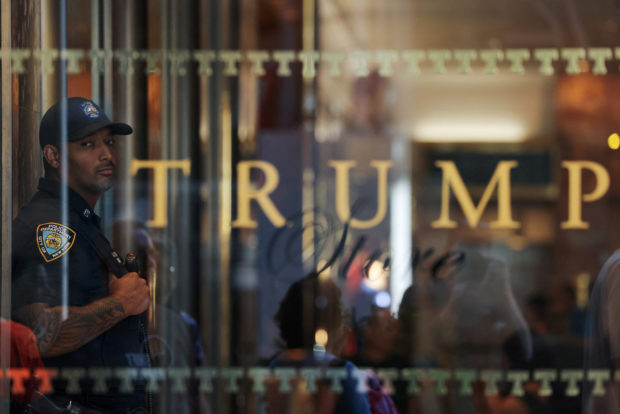FBI removed ‘top secret’ documents from Trump’s home, US gov’t says

An officer from the New York City Police Department (NYPD) stands guard inside Trump Tower, after former U.S. President Donald Trump said that FBI agents raided his Mar-a-Lago home in Palm Beach, Florida, in Manhattan, New York City, New York, U.S., August 12, 2022. REUTERS/Andrew Kelly
FBI agents who searched former President Donald Trump’s Mar-a-Lago home in Florida this week removed 11 sets of classified documents including some marked as “top secret”, the U.S. Justice Department said Friday while also disclosing it has probable cause to believe he violated the Espionage Act.
The bombshell disclosures were made in legal documents released four days after FBI agents carried out the search of Trump’s residence based on a warrant approved by a federal magistrate judge.
The Justice Department told U.S. Magistrate Judge Bruce Reinhart in its warrant application that it had probable cause to believe that Trump violated the Espionage Act, a federal law that prohibits the possession or transmission of national defense information.
FBI agents took more than 30 items including more than 20 boxes, binders of photos, a handwritten note, and the executive grant of clemency for Trump’s ally and longtime adviser Roger Stone, a list of items removed from the property showed. Also included in the list was information about the “President of France.”
READ: FBI search of Trump’s Florida home was ‘by the book,’ ex-prosecutors say
Article continues after this advertisement“Top secret” is the highest level of classification, reserved for the country’s most closely held national security information. It is usually kept in special government facilities because its disclosure could cause grave damage to national security.
Article continues after this advertisementNumerous federal laws prohibit the mishandling of classified material, including the Espionage Act as well as another statute that prohibits the unauthorized removal and retention of classified documents or material. Trump increased the penalties for this while he was in office, making it a felony punishable by up to five years in prison.
Earlier on Friday, Trump denied a Washington Post report that the FBI search of his Mar-a-Lago home was for possible classified materials related to nuclear weapons, writing on his social media account that the “nuclear weapons issue is a hoax.”
READ: FBI sought nuclear documents in search of Trump’s home — Washington Post
Reuters could not immediately confirm the Washington Post report. Attorney General Merrick Garland has declined to publicly detail the nature of the investigation.
Monday’s search of Trump’s home marked a significant escalation in one of the many federal and state investigations he is facing from his time in office and in private business, including a separate one by the Justice Department into a failed bid by Trump’s allies to overturn the 2020 presidential election by submitting phony slates of electors.
Garland on Thursday announced that the department had asked Reinhart to unseal the warrant that authorized the FBI search of Mar-a-Lago. This followed a claim by Trump that the search was political retribution and a suggestion by him, without evidence, that the FBI may have planted evidence against him.
Trump’s attorneys on Friday afternoon signaled they will not object to having the search warrant for his Florida residence unsealed to the public, the Justice Department said in a court filing, indicating the unsealing could come shortly.
Reinhart had imposed a 3 p.m. EDT (1900 GMT) deadline for prosecutors to let him know if Trump’s legal team will oppose the unsealing of the warrant.
‘Release the documents’
Late on Thursday, Trump released a statement on social media saying he did not intend to oppose its release.
“Release the Documents Now!” Trump wrote.
The investigation into Trump’s removal of records started this year, after the National Archives and Records Administration, an agency charged with safeguarding presidential records that belong to the public, made a referral to the department.
READ: Explainer: What charges might Trump face for removing White House records?
On Friday, Republican members of the U.S. House of Representatives Intelligence Committee called on Garland and FBI Director Chris Wray to release the affidavit underpinning the warrant, saying the public needs to know.
“Because many other options were available to them, we’re very concerned of the method that was used in raiding Mar-a-Lago,” Representative Michael Turner, the committee’s top Republican, told reporters.
If the affidavit remains sealed, “it will still leave many unanswered questions,” Turner added.
In February, Archivist of the United States David Ferriero told House lawmakers that his agency had been in communication with Trump throughout 2021 about the return of 15 boxes of records. He eventually returned them in January 2022.
READ: US confirms search of Trump’s home, asks court to unseal warrant
At the time, the National Archives was still conducting an inventory, but noted some of the boxes contained items “marked as classified national security information.” Trump previously confirmed that he had agreed to return certain records to the Archives, calling it “an ordinary and routine process.” He also claimed the Archives “did not ‘find’ anything.”
Since Monday’s search, the Justice Department has faced fierce criticism and online threats, which Garland have condemned. Trump supporters and some of his fellow Republicans in Washington have accused Democrats of weaponizing the federal bureaucracy to target him even as he mulls another run for the presidency in 2024.
In another matter, Trump on Wednesday declined to answer questions during an appearance before New York state’s attorney general in a civil investigation into his family’s business practices, citing his constitutional right against self-incrimination.